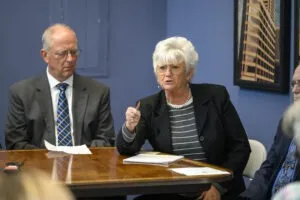
In a historic courtroom, the Archdiocese of Baltimore welcomed six courageous survivors stepped forward to recount their personal tales of trauma, their voices finally heard thanks to the lifting of time limits for lawsuits under Maryland’s Child Victims Act. Among them, our client, Eva Dittrich, at 68 years young, shared her heart-wrenching narrative, defining herself not by the words of her abuser, but by her indomitable spirit of survival.
As reported in The Baltimore Sun: “Her priest, Father Joseph Maskell, responded by telling her she was “a whore,” but that he would “try to cleanse me of my sins in private counseling sessions,” Dittrich said in court Monday. “These sessions were actually sexual abuse,” she testified. Maskell later invited her into his car and on boat rides, where he “violently raped” her, Dittrich recalled. “I tried to jump out of the boat. I would rather drown,” she said, adding that she attributed a lifetime of nightmares, tumultuous relationships and decades of intensive psychotherapy to the torment she endured decades ago.
For a free legal consultation, call,
(888) 585-2188
This wasn’t just a bankruptcy proceeding; it was a public acknowledgment of the decades of hidden anguish, a response to the attorney general’s report that exposed abuse dating back to the 1940s. It detailed the pain of over 600 children and the church’s subsequent concealment efforts. The law’s change was a hard-fought victory for survivors and advocates alike, catalyzed by the comprehensive report’s revelations.
In a packed courtroom, with church leaders present, a narrative unfolded, one that went beyond numbers and legal strategies. It was a narrative about the resilience of the human spirit and a poignant plea for accountability and reform. This legal chapter in the trial courts may have closed with the bankruptcy filing, but the story of recovery and justice is far from over. This day in court signified a significant step towards healing, making clear that those affected were victims of abuse, not of their own making. The bravery displayed within those walls echoed a promise: that silence would no longer shroud the survivors’ truth.
Following the hearing, Frank Schindler, a spokesperson for the Maryland chapter of Survivors Network of those Abused by Priests, declared that “this is a momentous week for child sexual abuse survivors.”
“We hope that our struggle will continue to go forward,” Schindler said. “We hope that justice will be done for all child sexual abuse survivors.”
Click to contact our personal injury lawyers today
For survivors of childhood sexual abuse, having the opportunity to share their stories can be a profound experience, often described as cathartic and validating. It provides a sense of justice and personal reclaiming of power that was taken from them. The importance of being heard extends beyond individual healing; it also fosters societal acknowledgment of these crimes and can catalyze systemic change. It breaks the isolating silence that many survivors have endured, offering a chance to be recognized as individuals who have endured, survived, and now stand tall against the shadows of their pasts. It is an important step toward healing, not just for the individuals involved but for the community as a whole, as it confronts and rejects the silence that has historically shrouded such abuse.
Complete a Free Case Evaluation form now
The claims against the AOB are proceeding in bankruptcy court rather than in traditional trial courts. A bankruptcy proceeding is a legal process where an entity, unable to meet its debt obligations, seeks relief from some or all of its debts. In the context of the Archdiocese of Baltimore, filing for bankruptcy offers a different procedural avenue than a jury trial. It’s a move often aimed at reorganizing debt and assets rather than a public airing of individual cases. Unlike in a jury trial, where survivors’ experiences are evaluated by their peers to determine liability and damages, bankruptcy court focuses on the debtor’s assets and debts, distributing them among creditors — which, in such cases, include survivors seeking compensation. This process may limit survivors’ opportunities to have their cases heard in the same detailed and individualized manner as they would in front of a jury. That is why the ability of these survivors in the bankruptcy court was especially meaningful.
The Maryland Child Victims Act, a monumental piece of legislation, has reshaped the legal landscape for survivors of child sexual abuse. It arose from a sweeping and somber report by the Maryland Attorney General, which chronicled systemic abuse at the hands of clergy within the Archdiocese of Baltimore. The Act, by lifting the statute of limitations, acknowledges the enduring pain of survivors and empowers them to seek justice, regardless of how much time has passed. This law symbolizes a collective acknowledgment of past wrongs and a commitment to righting them, ensuring that the stories of survivors are not confined to the past but are heard and acted upon today. It is not just a legal remedy, but a societal declaration that the time for change has arrived.
Call or text (888) 585-2188 or complete a Free Case Evaluation form
